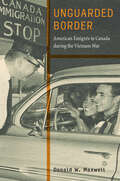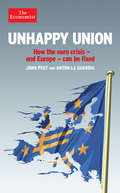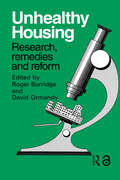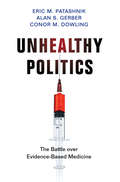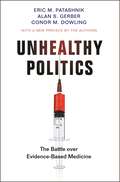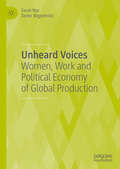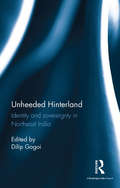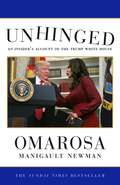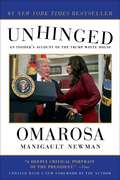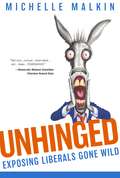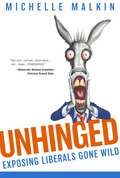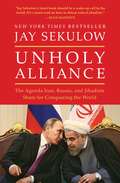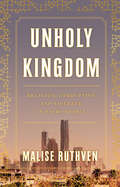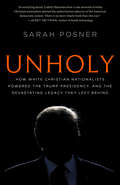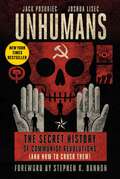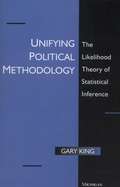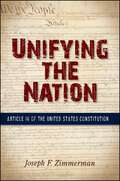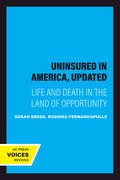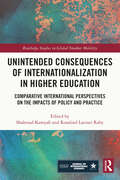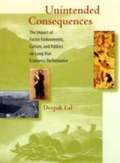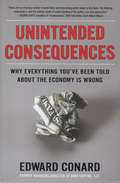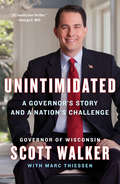- Table View
- List View
Unguarded Border: American Émigrés in Canada during the Vietnam War (War Culture)
by Donald W. MaxwellThe United States is accustomed to accepting waves of migrants who are fleeing oppressive conditions and political persecution in their home countries. But in the 1960s and 1970s, the flow of migration reversed as over fifty thousand Americans fled across the border to Canada to resist military service during the Vietnam War or to escape their homeland’s hawkish society. Unguarded Border tells their stories and, in the process, describes a migrant experience that does not fit the usual paradigms. Rather than treating these American refugees as unwelcome foreigners, Canada embraced them, refusing to extradite draft resisters or military deserters and not even requiring passports for the border crossing. And instead of forming close-knit migrant communities, most of these émigrés sought to integrate themselves within Canadian society. Historian Donald W. Maxwell explores how these Americans in exile forged cosmopolitan identities, coming to regard themselves as global citizens, a status complicated by the Canadian government’s attempts to claim them and the U.S. government’s eventual efforts to reclaim them. Unguarded Border offers a new perspective on a movement that permanently changed perceptions of compulsory military service, migration, and national identity.
Unhappy Union: How the Euro crisis -- and Europe -- Can Be Fixed (Economist Books)
by Anton La Guardia John PeetThe euro was supposed to create an unbreakable bond between the nations and people of Europe. But when the debt crisis struck, the flaws of the half-built currency brought the European Union close to breaking point after decades of post-war integration. Deep fault-lines have opened up between European institutions and the nation-states-and often between the rulers and the ruled-raising profound questions about Europe's democratic deficit. Belief in European institutions and national governments alike is waning, while radicals on both the left and the right are gaining power and influence. Europe's leaders have so far proved the doomsayers wrong and prevented the currency from breaking up. "If the euro fails, Europe fails," says Angela Merkel. Yet the euro, and the European project as a whole, is far from safe. If it is to survive and thrive, leaders will finally have to confront difficult decisions. How much national sovereignty are they willing to give up to create a more lasting and credible currency? How much of the debt burden and banking risk will they share? Is Britain prepared to walk away from the EU? And will other countries follow? In Unhappy Union, The Economist's Europe editor and Brussels correspondent provide an astute analysis of the crisis. They describe America's behind-the-scenes lobbying to salvage the euro, economists' bitter debates over austerity, the unseen maneuvers of the European Central Bank and the tortuous negotiations over banking union. In the final chapter, they set out the stark choices confronting Europe's leaders and citizens.
Unhealthy Housing: Research, remedies and reform
by R. Burridge D. OrmandyUnhealthy Housing presents an analysis of the research into the health implications of housing and the significance for legal regulation of housing conditions. Key experts present short papers, together with an overview to give an evaluation of the significance of housing on the health of occupiers.
Unhealthy Politics: The Battle over Evidence-Based Medicine
by Eric M. Patashnik Alan S. Gerber Conor M. DowlingHow partisanship, polarization, and medical authority stand in the way of evidence-based medicineThe U.S. medical system is touted as the most advanced in the world, yet many common treatments are not based on sound science. Treatments can go into widespread use before they are rigorously evaluated, and every year patients are harmed because they receive too many procedures—and too few treatments that really work. Unhealthy Politics sheds new light on why the government’s response to this troubling situation has been so inadequate, and why efforts to improve the evidence base of U.S. medicine continue to cause so much political controversy and public trepidation.This critically important book draws on public opinion surveys, physician surveys, case studies, and political science models to explain how political incentives, polarization, and the misuse of professional authority have undermined efforts to tackle the medical evidence problem and curb wasteful spending. It paints a portrait of a medical industry with vast influence over which procedures and treatments get adopted, and a public burdened by the rising costs of health care yet fearful of going against “doctor’s orders.” The book shows how the government’s efforts to promote evidence-based medicine have become mired in partisan debates. It also proposes sensible solutions that can lead to better, more efficient health care for all of us.Unhealthy Politics offers vital insights not only into health policy but also into the limits of science, expertise, and professionalism as political foundations for pragmatic problem solving in American democracy.
Unhealthy Politics: The Battle over Evidence-Based Medicine
by Eric M. Patashnik Alan S. Gerber Conor M. DowlingHow partisanship, polarization, and medical authority stand in the way of evidence-based medicineThe U.S. medical system is touted as the most advanced in the world, yet many common treatments are not based on sound science. Unhealthy Politics sheds new light on why the government's response to this troubling situation has been so inadequate, and why efforts to improve the evidence base of U.S. medicine continue to cause so much political controversy. This critically important book paints a portrait of a medical industry with vast influence over which procedures and treatments get adopted, and a public burdened by the rising costs of health care yet fearful of going against "doctor's orders." Now with a new preface by the authors, Unhealthy Politics offers vital insights into the limits of science, expertise, and professionalism in American politics.
Unheard Voices: Women, Work and Political Economy of Global Production
by Dieter Bögenhold Farah NazThis book explores the restructuring of the labour market and the opportunities that have resulted from economic globalization. The historical, political, geographical, and social relationships that female workers have had within the production process and the politics of work are examined to provide an understanding of the positioning of women within the global production system and the international division of employment.Unheard Voices: Women, Work and Political Economy of Global Production aims to give the reader an understanding of new workplace arrangements and the changing gendered patterns of work. The book is relevant to those interested in labour economics, the political economy, and gender studies.
Unheeded Hinterland: Identity and sovereignty in Northeast India
by Dilip GogoiThis book presents a comprehensive account of the debates on sovereignty, self-determination and nationalist upsurges in India’s Northeast, especially Assam. At a deeper level, it analyses how multi-ethnic societies engage with the nation state. Based on the framework of international relations and geo-politics, the volume locates internal tensions and contradictions among different ethnic groups, alongside the complex interrelationships between the centre and the region. It also proposes a new structure of ‘Common Ethnic House’ to resolve persistent inter-ethnic tensions among different communities and the impasse between the Northeast and the centre. This book will interest scholars and researchers of politics and international relations, sociology and social anthropology, area studies, peace and conflict studies, especially those concerned with South Asia and Northeast India.
Unhinged: An Insider's Account of the Trump White House
by Omarosa Manigault NewmanThe former Assistant to the President and Director of Communications for the Office of Public Liaison in the Trump White House provides a jaw-dropping look into the corruption and controversy of the current administration. Few have been a member of Donald Trump’s inner orbit longer than Omarosa Manigault Newman. Their relationship has spanned fifteen years—through four television shows, a presidential campaign, and a year by his side in the most chaotic, outrageous White House in history. But that relationship has come to a decisive and definitive end, and Omarosa is finally ready to share her side of the story in this explosive, jaw-dropping account. A stunning tell-all and takedown from a strong, intelligent woman who took every name and number, Unhinged is a must-read for any concerned citizen.
Unhinged: An Insider's Account of the Trump White House
by Omarosa Manigault NewmanThe former Assistant to the President and Director of Communications for the Office of Public Liaison in the Trump White House provides an eye-opening look into the corruption and controversy of the current administration. <P><P>Few have been a member of Donald Trump’s inner orbit longer than Omarosa Manigault Newman. Their relationship has spanned fifteen years—through four television shows, a presidential campaign, and a year by his side in the most chaotic, outrageous White House in history. <P><P>But that relationship has come to a decisive and definitive end, and Omarosa is finally ready to share her side of the story in this explosive, jaw-dropping account. A stunning tell-all and takedown from a strong, intelligent woman who took every name and number, Unhinged is a must-read for any concerned citizen. <P><b>A New York Times Bestseller</b>
Unhinged: Exposing Liberals Gone Wild
by Michelle MalkinWarning: Unhinged liberals are hazardous to the nation's health. They're slashing your tires. Burning your lawns. Heaving pies at Republican pundits. Hurling racist epithets at minority conservatives. Nursing nutty conspiracy theories. And pining publicly for the murder of President Bush. And they call us crazy? In Unhinged: Exposing Liberals Gone Wild, Michelle Malkin plays conservative Margaret Mead to the alien political creatures of the American Left. With uproarious detail and rollicking reportage, Malkin chronicles the bizarre world of leftists gone mad in their natural habitats: the mainstream media, academia, Hollywood, and Washington. Unhinged unmasks liberals who've completely abandoned rationality and reality. They're taking chainsaws and bayonets to campaign signs. Running down political opponents with their cars. Setting fire to political opponents in effigy. Defacing war memorials. Swiping yellow ribbons off cars...
Unhinged: Exposing Liberals Gone Wild
by Michelle MalkinUnhinged: Exposing Liberals Gone Wild by Michelle Malkin
Unholy Alliance: The Agenda Iran, Russia, and Jihadists Share for Conquering the World
by Jay SekulowThe New York Times bestselling author of Rise of ISIS exposes the dangers of radical Islam and the effects it has on the American way of life in this informative and eye-opening new book.In Unholy Alliance, Jay Sekulow highlights and defines the looming threat of radical Islam. A movement born in Iran during the Islamic Revolution in 1979, radical Islam has at its heart the goal of complete world domination. As this movement has grown, Iran has entered into alliances with Syria and Russia, leading to a deadly game of geopolitical threats and violence. Not only will you better understand jihadist terror, but you will also learn about Sharia law—a legal code that removes all personal liberty and is starkly incompatible with the US Constitution. All Muslims are required to follow Sharia—as are all who live in lands controlled by Islam. It is the goal of radical Islam to see Sharia instituted across the globe. If we are to combat radical Islam’s agenda of domination, we must arm ourselves with knowledge. With carefully researched history, legal-case studies, and in-depth interviews, Unholy Alliance lays out the ideology and strategy of radical Islam, as well as the path we must take to defeat it.
Unholy Ghost: The Road to Redemption Series (The\road To Redemption Ser. #5)
by James Green'Fixer' for the Vatican Jimmy Costello always liked Paris, but never got the chance to spend much time there. Now his boss in Rome wants him to go back. It's a simple job: find the missing owner of a piece of valuable property. But Jimmy's not the only one looking. What is he looking for and who else wants it so badly? No one seems to have the answers. This time Jimmy is on his own.
Unholy Kingdom: Religion, Corruption and Violence in Saudi Arabia
by Malise RuthvenReligion, oil, and war bent to the House of Saud&’s will to dominate Saudi Arabia and the wider Middle EastIn recent years the ruling family in Saudi Arabia, the House of Saud, has promoted the oil-rich kingdom as an open, liberalizing nation that has invested in culture, tourism, and social innovation to become a beacon for the region. International political manoeuvring, sports sponsorship, and the Vision 2030 programme with its vast architectural planning declare a bold future. But the murder in October 2018 of journalist Jamal Khashoggi in Istanbul reveals a darker reality: one of intensifying political and religious repression. This is within the tumultuous context of the war in Yemen, sectarian rivalry with Iran, the crisis in Gaza, and volatile relations with the United States.Malise Ruthven, a leading commentator on Islamic affairs, reconstructs the nation&’s history. He shows how the royal house co-opted Wahhabism to consolidate its power and enforce authoritarianism in collusion with Western businesses and governments. Unholy Kingdom looks to the nation&’s future in the hands of Crown Prince Mohammed Bin Salman, who touts the country&’s liberalisation while aggressively imposing his will upon the region.This essential book traces the shifting fault lines in the Middle East to determine Saudi Arabia&’s place in our volatile times.
Unholy: Why White Evangelicals Worship at the Altar of Donald Trump
by Sarah PosnerA &“masterful and meticulous&”* feat of reportage that explains one of the central mysteries of the Trump era: the unholy marriage of Trump and the evangelicals, as officiated by the alt-right.*Jane Mayer, author of Dark Money Why did so many evangelicals turn out to vote for Donald Trump, a serial philanderer with questionable conservative credentials who seems to defy Christian values with his every utterance? To a reporter like Sarah Posner, who has been covering the religious right for decades, the answer turns out to be far more intuitive than one might think.In this taut inquiry, Posner digs deep into the radical history of the religious right to reveal how issues of race and xenophobia have always been at the movement&’s core, and how religion often cloaked anxieties about perceived threats to a white, Christian America. Fueled by an antidemocratic impulse, and united by this narrative of reverse victimization, the religious right and the alt-right support a common agenda–and are actively using the erosion of democratic norms to roll back civil rights advances, stock the judiciary with hard-right judges, defang and deregulate federal agencies, and undermine the credibility of the free press. Increasingly, this formidable bloc is also forging ties with European far right groups, giving momentum to a truly global movement. Revelatory and engrossing, Unholy offers a deeper understanding of the ideological underpinnings and forces influencing the course of Republican politics. This is a book that must be read by anyone who cares about the future of American democracy.
Unhumans: The Secret History of Communist Revolutions (and How to Crush Them)
by Jack Posobiec Joshua LisecUSA TODAY and PUBLISHERS WEEKLY NATIONAL BESTSELLER If you don&’t understand communist revolutions, you aren&’t ready for what&’s coming. The old rules are over. The old order is over. Accusations are evidence. Activism means bigotry and hate. Criminals are allowed to roam free. Citizens are locked up. An appetite for vengeance is unleashed—to deplatform, debank, destroy. This is the daily news, yet none of it&’s new. Patterns from the past make sense of our present. They also foretell a terrifying future we might be condemned to endure. For nearly 250 years, far-left uprisings have followed the same battle plans—from the first call for change to last innocent executed, from denial a revolution is even happening to declaration of the new order. Unhumans takes readers on a shocking, sweeping, and succinct journey through history to share the untold stories of radical takeovers that textbooks don&’t teach. And there is one conclusion: We're in a new revolution right now. But this is not a book about ideology or politics. Unhumans reveals that communism, socialism, Marxism, and all other radical-isms are not philosophies but tactics—tactics that are specifically designed to unleash terror on everyday people and revoke their human rights to life, liberty, and property. These are the forces of unhumanity. This is what they do. Every. Single. Time. Unhumans steals their playbook, breaks apart their strategies piece by piece, and lays out the tactics of what it takes to fight back—and win, using real-world examples. Unhumans is an essential read for every concerned citizen both in the US and worldwide. We must stop what is coming.
Uniform Feelings: Scenes from the Psychic Life of Policing
by Jessi Lee JacksonIn Uniform Feelings, American studies scholar and abolitionist psychotherapist Jessi Lee Jackson reads policing as a set of emotional and relational practices in order to shed light on the persistence of police violence. Jackson argues that psychological investments in U.S. police power emerge at various sites: her counseling room, manuals for addressing bias, museum displays, mortality statistics, and memorial walls honoring fallen officers. Drawing on queer, feminist, anticolonial, and Black engagements with psychoanalysis to think through U.S. policing—and bringing together a mix of clinical case studies, autotheory, and ethnographic research—the book moves from the individual to the institutional. Jackson begins with her work as a psychotherapist working across the spectrum of relationships to policing, and then turns to interrogate carceral psychology—the involvement of her profession in ongoing state violence. Jackson orbits around two key questions: how are our relationships shaped by proximity to state violence, and how can our social worlds be transformed to challenge state-sanctioned violence?
Unifying Political Methodology: The Likelihood Theory Of Statistical Inference (Techniques In Political Analysis Series)
by Gary KingThis book is about methodology in political science. Its purpose is to unify existing methods and formulate some new methods, under a general theory of statistical inference. As explained in Section 1.1, it is also intended to stimulate and centralize methodological debate in political science.
Unifying the Nation: Article IV of the United States Constitution
by Joseph F. ZimmermanWhile there is a vast amount of scholarship on the US Constitution, very little of it addresses Article IV. The article's first section, the Full Faith and Credit Clause, requires that individual states must respect "the public acts, accords, and judicial proceedings of every other state," and the second section, the Privileges and Immunity Clause, prevents one state from treating the citizens of another state in a discriminatory manner. In Unifying the Nation, Joseph F. Zimmerman provides a unique and comprehensive examination of court cases pertaining to both sections. Article IV, he argues, is central to the political and economic union of the individual states that comprise the nation. Many of the court cases cited in the text have tremendous day-to-day relevance and implications for the practice of government, such as same-sex marriage, child adoption, child support, public welfare, health care, and telecommunications.
Uninsured in America, Updated: Life and Death in the Land of Opportunity
by Rushika Fernandopulle Susan SeredUninsured in America goes to the heart of why more than forty million Americans are falling through the cracks in the health care system, and what it means for society as a whole when so many people suffer the consequences of inadequate medical care. Based on interviews with 120 uninsured men and women and dozens of medical providers, policymakers, and advocates from around the nation, this book takes a fresh look at one of the most important social issues facing the United States today. A new afterword updates the stories of many of the people who are so memorably presented here.
Unintended Consequences of Internationalization in Higher Education: Comparative International Perspectives on the Impacts of Policy and Practice (Routledge Studies in Global Student Mobility)
by Rosalind Latiner Raby Shahrzad KamyabBy presenting case studies of internationalization in institutions of higher education around the world, this volume identifies unforeseen or unintended impacts within and across countries. With contributions from Africa, Asia, Europe, Latin America, Middle East, and North America the volume considers the nature and origin of positive and negative unintended consequences of internationalization policy and practice in national contexts, while also offering uniquely comparative insights. Chapters consider how internationalization is reflected in curricula, teaching, research, and mobility initiatives to highlight common pitfalls, as well as best practice for effective, sustainable, and equitable internationalization globally. Using a critical lens, the book explores how internationalization offers opportunities for learning, for entrepreneurial change, and for knowledge dissemination, and generates paradoxes and dilemmas in terms of political and ethical issues for individuals, communities, and the institutions themselves. Foregrounding the study of internalization in countries not typically studied, this book is a valuable resource for researchers and academics with an interest in internationalization, comparative and international education, and the sociology of education.
Unintended Consequences: The Impact of Factor Endowments, Culture, and Politics on Long-Run Economic Performance
by Deepak K. LalThe interaction of factor endowments, culture, and politics in explaining when and why intensive growth occurred is one of the major themes of this book. The other major theme is the role of individualism in promoting this growth, and the strange metamorphoses this in turn has caused when we look at the present day interaction between the West and the Rest.
Unintended Consequences: Why Everything You've Been Told about the Economy Is Wrong
by Edward ConardIn the aftermath of the Financial Crisis, many commonly held beliefs have emerged to explain its cause. Conventional wisdom blames Wall Street and the mortgage industry for using low down payments, teaser rates, and other predatory tactics to seduce unsuspecting home owners into assuming mortgages they couldn't afford. It blames average Americans for borrowing recklessly and spending too much. And it blames the tax policies and deregulatory environment of the Reagan and Bush administrations for encouraging reckless risk taking by wealthy individuals and financial institutions. But according to Unintended Consequences, the conventional wisdom masks the real causes of our economic disruption and puts us at risk of facing a slew of unintended--and potentially dangerous--consequences. This book addresses many essential but overlooked questions, such as: If the United States had become a nation of reckless consumers rather than investors, why did productivity soar in the years leading up to the meltdown? If predatory bankers took advantage of home owners, why did down payments decline, thereby shifting risk from home owners to lenders? If the risks were easy to spot, why did top political and financial advisers encourage lenders to make unsound investments? If new regulations encourage banks to hold enough capital to fund withdrawals and not just loan losses, how will the economy underwrite the risks necessary to reach full employment? In an attempt to set the record straight and fill the void left by other analysts, Conard presents a fascinating and contrarian case for how the economy really works, what went wrong over the past decade, and what steps we can take to start growing again.
Unintimidated
by Scott Walker Marc Thiessen"Today, we can sound like conservatives and act like conservatives--and still win elections. Those who say we can't don't see what I see in Wisconsin and what my fellow governors in states all across America see. We don't need to change our principles. What we need is more courage." In 2011, Wisconsin governor Scott Walker's chances of staying in office looked bleak. Angry protesters--furious about his collective bargaining proposal--swarmed Madison, camped in the capitol, and attempted to block the passage of the governor's reform legislation. Teachers unions accused him of sabotaging education. His approval numbers fell to the basement, and with the national media's descent on Wisconsin, liberals denounced "Dead Man Walker." He found himself fighting for his reforms, fielding death threats, and facing an unprecedented recall election. But then something happened. Walker's policies began to work. His constituents realized they were better off with his leadership, and in June 2012, he became the first governor in American history to survive a recall attempt, winning with a higher share of the vote than he had for his original election. In Unintimidated, Governor Walker tells the story of his fight to save Wisconsin from a $3.6 billion budget deficit while simultaneously improving the state's schools and public infrastructure. He describes how he stood for his convictions against enormous political pressure and personal attacks. He explains how he knew his reforms would work, based on his experience as a local official. Speaking from the perspective earned from his resounding victory, he outlines lessons conservatives on the national stage can learn from his success, such as: * Change the polls, not your principles. * Don't accept the false choices presented to you. * You can reform entitlements and survive. * Austerity is not the answer. * Never stop reforming. Walker is living proof that conservatives need not move to the center to win. He argues that Republicans must offer Americans big, bold, positive solutions for our nation's challenges--and have the courage to implement them. Walker has shown that even President Obama will back down when faced with reforms promoted with common sense and courage.
Unintimidated
by Scott WalkerA controversial governor recounts his fight to reform his state and issues a call to action for the whole country In 2010, Scott Walker was elected governor of Wisconsin with a mandate to improve its economy and restore fiscal responsibility. With the state facing a $3. 6 billion budget deficit, he proposed a series of reforms to limit the collective bargaining power of public employee unions, which was costing taxpayers billions in pension and health care costs. The reaction was swift and severe. Angry protesters gathered outside the capitol, teacher unions accused him of sabotaging education, and the media descended on Wisconsin to make it a national controversy. Soon, liberals nationwide were denouncing Governor Walker. He stood his ground despite relentless political and personal attacks with the help of supporters across the country who hailed him for having the courage to drive real change. In June 2012, he won a special recall election with a higher share of the vote than he had for his original election, becoming the first governor in the country to survive a recall election. In this book, Governor Walker shows how his commitment to limited but effective government paid off. During his tenure Wisconsin has saved more than $1 billion, property taxes have gone down for the first time in twelve years, and the deficit was turned into a surplus. He also shows what his experiences can teach defenders of liberty across the country about standing up to the special interests that favor the status quo. .
